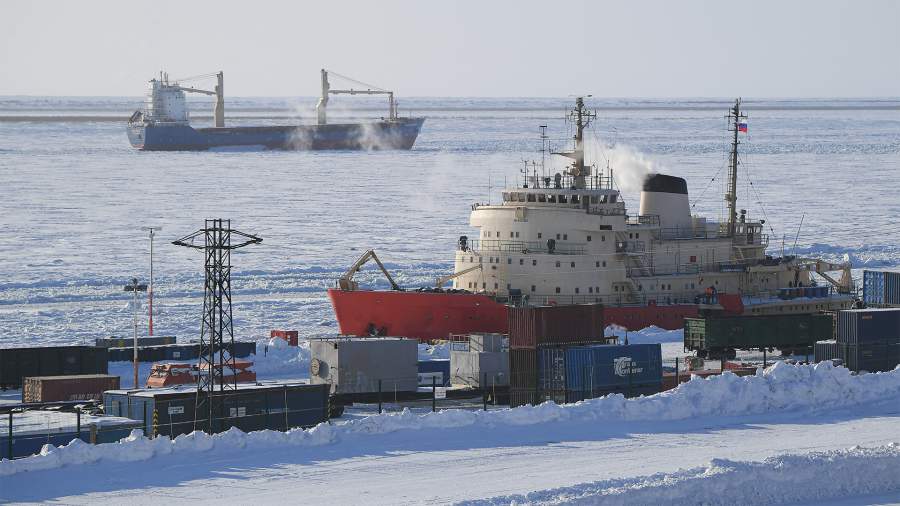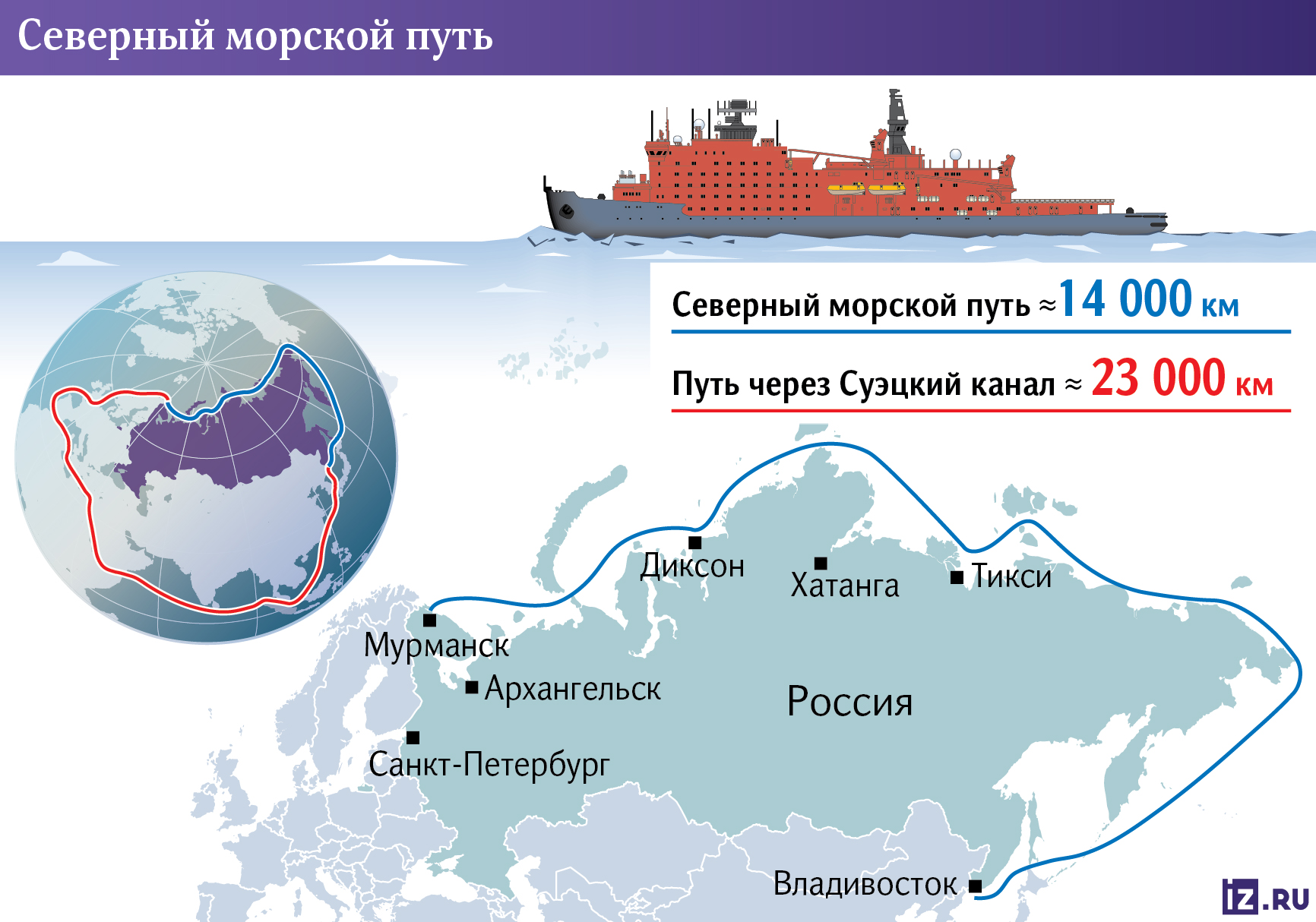Switch channel: Egypt is exploring the possibilities of the Northern Sea Route

Cairo does not consider the Northern Sea Route as a threat to the Suez Canal and hopes for their complementarity rather than competition. Egyptian Ambassador to Russia Nazih Elnaggari told Izvestia about this, adding that his country is closely monitoring the development of the Arctic route. At the same time, cooperation between Moscow and Cairo is not limited to the logistics sector. The diplomat noted that Russian companies are showing interest in oil and gas projects in the Mediterranean Sea and the Nile Delta. The El-Dabaa NPP project will create new opportunities for employment, scientific research and the development of national competencies in Egypt. Whether the Northern Sea Route can affect the volume of cargo transportation through Suez is in the Izvestia article.
The impact of the Northern Sea Route on trade through the Suez Canal
Cairo expects that the Northern Sea Route and the Suez Canal will be able to complement each other rather than compete, Egyptian Ambassador to Russia Nazih Elnaggari told Izvestia. According to him, Egypt is closely following the development of the Arctic route and hopes for mutually beneficial coexistence of transport corridors.
— The Northern Sea Route is a fairly new project. We are interested in following its development and exploring its potential. But I think we can make the Northern Sea Route and the Suez Canal complementary. We should not look at them in the context of competition. These routes can complement each other in the future," Egyptian Ambassador to Russia Nazih Elnaggari told Izvestia at the BRICS Women's Entrepreneurship Forum.
Discussions about the redistribution of cargo flows became especially acute after the giant container ship Ever Given blocked the Suez Canal for several days on March 23, 2021. According to experts, the losses of world trade amounted to about $70 billion, and ships had to urgently change routes and circumnavigate Africa, which increased the cost of logistics by at least $300 thousand in fuel alone for each vessel.
The Arctic could be an alternative. The Northern Sea Route (NSR), which covers the Russian part of the Arctic from Murmansk to Chukotka, is considered as a potential backup route. The "Spatial Development Strategy of the Russian Federation for the period up to 2025" explicitly states the need to transform the NSR into a full-fledged international transport corridor. For this purpose, in particular, the icebreaking fleet is expanding.
However, the northern route has a number of challenges. The main reason is the limited navigation time: even despite the warming and reduction of the ice cover, navigation is possible only for about seven months a year. In addition, most ships need icebreaking wiring, as they do not have the appropriate hull class.

In Arctic conditions, fuel consumption also increases, which reduces the economic benefits of reducing the distance — even if the route is shorter than the Suez route by almost 40%. Nevertheless, climate change is opening up new horizons. According to various forecasts, by 2050-2060, the central part of the Arctic Ocean may become passable even without icebreakers. The issue also raises the loading of ships on the way back, so that the ship does not return empty.
According to Egyptian Professor of Economics and Energy Wafa Ali, the Suez Canal has no real alternatives in the foreseeable future.
— Despite the search for bypass routes, Suez remains the safest and most efficient trade route. The Northern Sea Route is limited by high cost, seasonality, shallow depth (up to 9 m versus 18.5 m in Suez) and the need for icebreaking escort," she explained to Izvestia.
But despite its maturity and infrastructural development, Suez is facing challenges: high workload, geopolitical risks and possible blockages, as the case of Ever Given has shown. In these circumstances, duplicate routes are not just logistics, but a necessity.
It is also worth noting the crisis in the Red Sea related to the Houthi attacks after the escalation of the Palestinian-Israeli conflict. The head of the Suez Canal Administration, Osama Rabia, said that since the beginning of the crisis, more than 6.6 thousand ships have changed their standard routes through the Suez Canal and proceeded through the Cape of Good Hope in the south of the African continent. This year, Cairo will not receive about $7 billion due to the decline in shipping against this background.
The average volume of cargo transportation through Suez is approximately 1.5 billion tons, while cargo traffic through the NSR in 2024 amounted to 37 million tons. By 2030, this figure should increase to 70-100 million tons. This was announced by Russian President Vladimir Putin in March.
Interest of Russian companies in oil and gas production in Egypt
Cooperation between Egypt and Russia also concerns the energy sector, which remains one of the key points of contact between the two countries. As Egyptian Ambassador Nazih Elnaggari told Izvestia, Russian companies are showing steady interest in oil and gas projects in the Arab country.
— Russian companies are interested in oil and gas exploration in the Mediterranean and the Nile Delta. — Ed.), while there are attractive projects and potential for benefits. Hassan Al-Khatib, the Minister of Investment and Foreign Trade, was recently in Moscow, and he met with a number of companies, including oil companies, that showed interest in the Egyptian market, the head of the Egyptian diplomatic mission told Izvestia.
Deepening cooperation in the energy sector is becoming especially relevant against the background of the internal difficulties Egypt is facing today. The country's natural gas production has been declining to its lowest levels in recent years. One of the leading countries in the Arab world, which until recently supplied gas to Europe, is now forced to purchase fuel from foreign markets itself in order to maintain stable operation of the energy system.
"Under these conditions, the Russian-Egyptian partnership makes it possible to clarify many uncertainties in such an important economic area," said Wafa Ali.
According to the expert, Russia and Egypt have established a model of interaction between energy and sustainable development, while strengthening the foundations of economic growth and national security. Of particular importance is Russian support in reducing the energy gap within Egypt, both in the traditional sector and in the field of renewable energy sources.
According to the expert, special attention should be paid to the implementation of the El-Dabaa NPP project, which should not only become a source of 4,800 MW of clean energy, but also create new opportunities for employment, scientific research and the development of national competencies. Russian companies are also actively involved in the exploration and production of oil and gas, and in the green energy segment, the parties share a common agenda within the framework of the BRICS.
— Russia has become an important partner in the issue of supplies to cover the shortage of natural gas needed for the operation of power plants. Precise mechanisms for solving the energy deficit are impossible without sustained Russian-Egyptian coordination in this key economic area," concludes Wafa Ali.
The government of President Abdel Fattah al-Sisi has promised to end planned power outages, which in some areas reached three hours a day. Solving this crisis is becoming one of the key tasks for the Egyptian leadership. The country's Prime Minister, Mustafa Madbuli, in turn, said that there would be no power outages this summer, confirming the government's readiness for the expected increase in electricity demand.
Переведено сервисом «Яндекс Переводчик»
